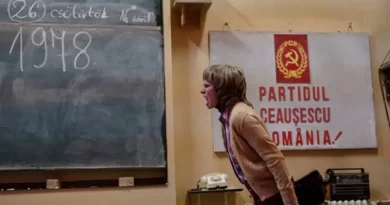“The Last Bantam”, Edinburgh Festival Fringe
theSpace @ Surgeons Hall – Theatre 2
12:15. Duration 30 minutes.
To 26 August (not 20)
Jeremy Malies in Edinburgh
18 August 2023
**** Four-star review
Twenty years ago I saw a production of Oh! What A Lovely War! during the Fringe at Inverleith Church Hall. Afterwards, I happened to watch a father and son cover perhaps 100 yards from the hall to their car. The father turned on his heel, pointed to the distance they had walked and said: “Throughout that whole play, the amount of ground being fought over would have been less than what we’ve just walked!”
Proximity of the enemy in confined space is one of the first points stressed by Michael Hughes’s character, Patrick, in this excellent play. “Two hundred yards over there is a sniper. And he’s very good!” Patrick puts us on our toes as we attend a briefing about the Great War and his service to date, the underlying idea being that we are journalists. Patrick is a corporal from Dublin who was a teacher in Civvy Street. He is about the last among his bantam (5ft–5ft 3ins) colleagues left standing. If we the audience are to remain alive we must never stick our head over the trench parapet.
Patrick’s postings are a rollcall of major battles on the Somme and Flanders. He is a proud man and quick to tell us that he is not a conscript. He signed up to be here having been told (and swallowing it whole) that the more Dubliners who volunteered for the British Army the more chance they had of Home Rule after the conflict. (“A true government for North and South”.)
Having crossed the Irish Sea when war broke out, he marched from Birkenhead to Durham offering himself at recruiting stations, often to be told: “Go away! Titch!” His chances of seeing action were transformed with the advent of bantam battalions of strong fit and skilled men (often miners and dockers) who were of below average height. The bantams proved adept at planting mines in underground works, and Patrick proudly tells us that the tank crews at Cambrai who enjoyed such success included brave bantams who faced certain death should their vehicles break down.
There is history and also assured handling of politics in this play. (Essentially it is a monologue but like an Alan Bennett “Talking Head”, Michael creates a world for us populated by his character, his peers, superior officers, the enemy and civilians.) There are many intense moments and during one of these Michael projects his character’s revulsion at a betrayal in a manner that I have not seen from an actor in years. He tells us, almost conspiratorially since he wonders if we will be able to digest it, that during the Easter Rising of 1916 the British Army fired live bullets at civilians on the streets of Dublin and shot to kill.
The rebels were broadly seeking the same Home Rule outcome. Patrick sneers at them and their German-made rifles. Ironically, men from his Sherwood Foresters regiment were sent to Ireland to put down the rising and even form the firing squads. There is no anti-imperialism here as in O’Casey’s The Silver Tassie but, interestingly since it is from the other end of the sectarian lens, a celebration of Irish valour of the kind we see in Frank McGuinness’s Behold the Sons of Ulster Marching Towards the Somme.
It’s acting of the highest order and I hope Hughes is recognized with an award. He has all the technical requirements; he can make his eyes swim, become lyrical within a few beats while relishing lush adjectives and he sets the theatre abuzz with a marching song.
Any criticisms? I should have liked the script to push harder at the idea that the audience is a group of journalists, and something from the pantheon of poetry at the time — Brooke, Owen, Sassoon or Thomas — might have changed the tempo and given the monologue room to breath.
A day after I saw the show I watched from atop a bus as Michael strode along Nicolson Street hawking his show. I was struck by the amount of kit he was carrying on every part of his torso. There would have been no concessions regarding pack weight for bantams.
A refreshing feature: no class hatred here though it should be said that Patrick is probably lower-middle class. It’s class-aware for sure and we know that initially the officers were from public schools. There are plenty of good gags including a description of the relative immunity of the bantams from sniper fire while around trenches as a Darwinian paradigm – survival of the shortest! This is an outstanding show.









